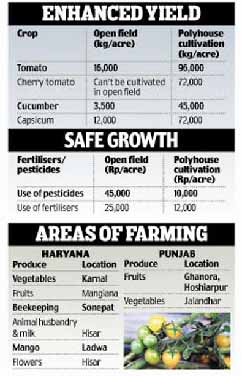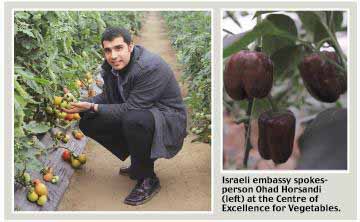
If one comes across chocolate, red or yellow capsicums in the Delhi market, one should not be surprised on being told that it was not imported but grown in a Haryana farm.
The traditional practice of growing vegetables in an open field is a passé as Haryana farmers are fast discovering. A large number of growers in the vegetable belt of the agriculture state surrounding New Delhi have adopted Israel’s polyhouse farming.
The technique not only helps increase the yield by five to eight fold, but the farmers can reap benefits of growing new varieties of vegetables like coloured capsicums, cherry tomatoes and cucumber.
A small but steady transformation is underway in Haryana, triggered by Indo- Israeli Centre of Excellence for Vegetables that came into existence only three years ago. It is proving to be a catalyst in bringing a change in cultivation habits.
Located in Karnal, the organisation is a nerve centre of activities as curious farmers are eager to know about new technique to increase the yield.
“ In the last three years alone 1,400 hectares of area has come under polyhouse farming from a meagre 30 hectares,” Dr A. S Saini, additional director, horticulture department of Haryana government told M AIL T ODAY . “ With a large population to feed, the only way to increase production is by adopting hightechnology farming.
The Israeli experts have helped us immensely and the technique has become a big hit among farmers,” said Dr Satyender Yadav, a vegetable expert working at the Centre which is part of India- Israel agricultural cooperation project.
Yadav explained that harvest period of various vegetables was increased from three months to nine months with the help of new Israeli technique.
The introduction of new varieties, like cherry tomatoes and coloured capsicums, contributed significantly to the income of the local farmers.
The polyhouse farming is all about growing vegetables in controlled conditions as the farms are covered and protected from the illeffects of weather, soil conditions and insects through nets, ultraviolet films and sheets. The plants are nurtured with water- conserving measures of drip irrigation and a healthy mix of fertilisers. The result is high- quality produce and farmers can grow more from their small piece of land.
The technique, which is widely used in Israel, has gained popularity, but the question still remains about its economic viability.
For a land of 1,000 square metre, a farmer wishing to switch to polyhouse farming would have to make an investment of around ` 10 lakh. Even after heavy government subsidy, the farmer will have to bear 3.5 per cent of the cost. For small and marginal farmers, costs are still high, despite subsidy. But for those who can make the initial investment, the technique has been extremely beneficial.
The centre has come up after a prolonged effort of Indian and Israeli governments. Farmers are taken to Israel to learn the technique.

INDO- ISRAEL SUCCESS STORY
· Indo- Israel Centre of Excellence for Vegetables started operating in 2011. It was set up under Indo- Israeli Agricultural Cooperation Project started in 2006.
· From 33 hectares, 1,400 hectares of land has come under protective farming in Haryana within a short span.
· Israel is a major partner in India’s National Horticulture Mission ( NHM).
· As part of the programme, Indian and Israeli governments agreed to set up such Centres of Excellence focussing on vegetables, mangoes, pomegranates and citrus across the country.
· Karnal’s CEC is the second such point in the state apart from Mangiana in Sirsa which is scripting a fruit success story.
· The Centres of Excellence provide high quality, healthy, virus and pest- free saplings.
Polyhouse farming a big hit in Karnal

BARELY a few kilometres away from the busy national highway passing through Haryana’s fastemerging town of Karnal lies Sheikhpur Khalsa. It can pass off as any nondescript village, despite its yellow mustard and lush wheat fields. But what sets the village apart is Sheikhpura Farm.
Spread over seven acres, Sheikhpur Farm is a co- operative formed by a group of farmers to grow vegetables, the Israeli style. Backed by the technological support provided by experts at the Indo- Israel Centre of Excellence for Vegetables in Karnal, polyhouse farming was adopted by the group of farmers to grow cucumber.
Sheikhpura Farm Fresh is owned by eight farmers who have invested jointly in developing the infrastructure, like setting up the polyhouses and developing localised irrigation network.
Israeli irrigation expert Yuval Elazar is impressed by the way farm has developed and is using the technology without little Indian improvisations. Now several such farms have come up around Karnal alone.
Polyhouse farming involves cultivation of vegetables in controlled atmosphere under ultraviolet film roofing and nets to keep the pests out. The protected farming has ensured that yield of cucumber has grown significantly.
All the produce is consumed instantly at the local market.
“ Cucumber is the most popular vegetable that farmers grow through protective farming technique because of the huge market,” said Satyender Yadav, vegetable expert at the Centre, adding that other vegetables like cherry tomatoes are not preferred because of lack of market for the produce. It can be in demand in big hotels in city like Delhi, but to grow the vegetable one needs to have adequate order from customers like hotels, he said.